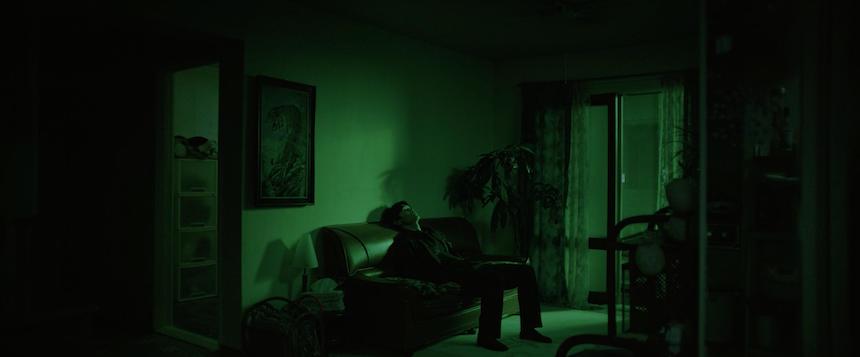Fantasia 2022 Review: CHOROKBAM, Green is the Loneliest Colour

I grew up what can charitably be descried as lower middle class. Like the central family Chorokbam essays, conversations almost always revolved around what things cost, going to and from work, and what we (or other people) are spending money on. It is both a practical and toxic mode of thought, when you are on a tight budget - to be constantly cognizant of money. It can bleed the joy out of things when one analyzes at every aspect of existence as a naked capital transaction. This film spoke to me. Hard.
Chorokbam (초록밤), translated from Korean, is Green Night. Indeed, visually the film is heavily saturated in the eponymous colour, be it the verdant trees on the central families apartment block, or the sickly light that seeps into various windows of the family apartment. I am trying to be careful with our western cultural metaphors and assumptions here, but I have been told that in South Korea, green often represents hope. That is seemingly at odds in America, where it generally means money. Or envy. Often envy of money.
All of these things are floating in the ether of Yoon Seo-jin’s meticulously framed first feature. Shot in deliberate static takes, which are subtle, living and breathing, almost selft contained, scenes. There is some of the most subtle dolly work I have ever seen. This is nearly imperceptible, only in a few sequences, and I would doubt my own observations if it were not for one shot, in a police station, that confirms it. It makes me wonder how such a slow push-in is even possible without some fancy technique. I mean at best the camera moves no more than a few millimeters. If it is indeed there, I believe that Yoon did this more to be subconsciously felt (think of the way so many horror movies use slow push-ins) and not consciously observed.
The family members, father, mother, and their adult son, occupy the spaces within the frame or often just out of view, to articulate the emotional chasms between them. The father works as a night guard in a lush area of urban parks and office buildings. Making his rounds one evening, he comes upon a cat which as been cruelly hung in a noose at a childrens playground.
This turns out to be a portent omen of things to follow. His own father passes, bringing the immediate and extended family together to sort out the estate. Immediately, there is a spectacular fight at the funeral, over who deserves what. The adult grandson, is shown in a doorframe, in razor sharp focus, as the aunties yell and pull hair, slightly out of focus in the foreground. He (and we) are a silent observers in the horror at the callow drama. As all the fancy film-nerds say, this is exquisite mise-en-scène.
Earlier, we see him in his day job as a personal support worker, transporting wheelchair bound seniors from hospital to home. He visits his girlfriend in a hotel. The young couple discuss the money spent a lot on hotels, and talk about getting married on the cheap, as a fast track to home ownership. The family apartment, of which the girlfriend is either not known or not welcome, is micro-sized, even for only three inhabitants. Over the course of the film, we indeed get to observe it from several angles to appreciate how tiny it is. An exemplary way to craft a story that is deceptively complex.
There is a portrait of a roaring tiger on the wall, which is perhaps the only thing that could be considered a visual joke in the film, given how joyless and empty these characters lives are. As minute as the place is, they all eat in separate ares of the kitchen. You can morally judge if you like, or blame the unfairness of the universe. The family may lean towards Eastern Buddhism, as the funeral service shows, but it feels the very worst aspects of spartan Western Protestantism.
While plotting is not the focus of the film, there is certainly plenty of story going on in Yoon’s very patient show-don’t-tell delivery. The movie magic here, is getting oneself lost in its gorgeous frames which find beauty in mundanity, or profundity in nature. This can often be ironically (but never amusingly) in contrast to the emptiness of the families existence. The dense soundtrack, often loud with urban or natural noises, even some occasional dialogue, are often things happening outside the frame. When and how characters enter, or exit, the frame over the course of a shot drives the storytelling. This family is isolated and lonely, even as their financial ‘ship has come in,’ and nearly every frame finds an interesting way to capture the varied nuances of dysfunction.
I cannot think of an imperfect moment, or edit, in the entirety of this film. While certainly not for everyone, Chorokbam offers endless rewards for the patient viewer, aesthetics to formalism, and yes, even narrative. The film is, perhaps, more streamlined than recognized masters of the form (such as Apichatpong Weerasethakul or Hou Hsiao-hsien) but Yoon’s technique is as confident, and visually on par with best of them. That is kind of astonishing, to say the least, for a debut feature executed in this challenging storytelling mode.
The final ambiguous message of the film is, at least on the surface, one of hope (as the colour says), but could equally one of how the working class will endlessly wallow in its anxiety of circumstance. An endless toxic sleepwalk. And to suffer from a possession of even the smallest of financial privilege. Choose your path, and your colour affiliations, wisely.
Chorokbam
Director(s)
- Seo-jin Yoon
Writer(s)
- Seo-jin Yoon
Cast
- Tae-hoon Lee
- Min-Kyung Kim
- Kang Gil-woo

Do you feel this content is inappropriate or infringes upon your rights? Click here to report it, or see our DMCA policy.






